- The PrideNomad Letter
- Posts
- PN 176: Stolen iPhone in Medellín taught me something about queer nomad life...
PN 176: Stolen iPhone in Medellín taught me something about queer nomad life...
Plus: Colombia's stupidly affordable digital nomad visa breakdown (spoiler: it's easier than you think)
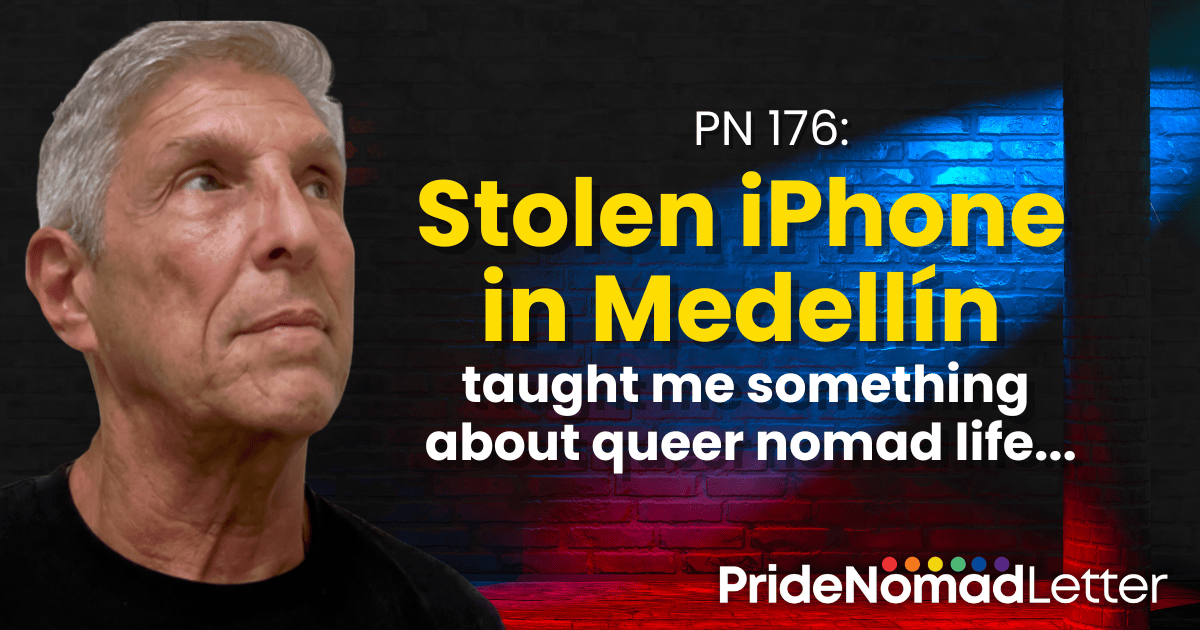
New to us? Before we begin— Please REPLY and let us know you received this! Not only does it help with deliverability, but I personally read every response. Tell me: What brought you to the PrideNomad community?
Hey, PrideNomad!
👉Was this forwarded to you? Be sure to receive our next destination deep-dive. Sign up here. It’s Free!
Today’s PrideNomad™ Quiz:
Which Middle Eastern city quietly legalized same-sex sexual activity decades ago and remains one of the few places in the region where LGBTQ+ nightlife — while still underground — has a distinct presence?
In Today’s Email:
Destinations: Colombia, with a Medellin Focus.
Battle of the Neighbors: Spain vs. Portugal. You Win!
DESTINATIONS:
✈️ Colombia’s Digital Nomad Visa (2025): What You Need to Know
Thinking about Colombia for your next chapter? You’re not alone. With stunning landscapes, artistic energy, and one of the most affordable queer-friendly visa programs in the world, Colombia has quietly become one of the most compelling homes for LGBTQ+ digital nomads in 2025.
But what’s actually involved?
Here’s the real, practical, and soul-aligned breakdown.
🛂 Visa Overview: Stay Up to 2 Years—Without Jumping Through Hoops
Colombia’s Digital Nomad Visa was created for remote workers, freelancers, and online entrepreneurs working for clients or companies outside Colombia.
Duration: • Up to 2 years
Application: • 100% online, or through a Colombian consulate
Processing Time: • As quick as a few days, but officially: up to 30 days
Who It’s For:
• Remote workers •
Freelancers
• Entrepreneurs
• Founders building something beautiful—on their own terms
💸 Income Requirement: Achievable (Even if You’re Just Starting Out)
Unlike many digital nomad visas that require 5-figure savings or inflated proof of income, Colombia keeps it grounded.
Minimum Monthly Income:
• 3x the Colombian minimum wage = approx. USD $970/month in 2025
You’ll Need to Show:
• A letter from your employer or proof of freelance/entrepreneurial work
• Bank statements from the last 3 months
• Health insurance covering your full stay in Colombia
• All documents in Spanish or with certified translations
💰 Visa Costs (USD)
Application Fee $50
Visa Fee $170–$230
Note: Add translation and certification fees if your documents aren’t in Spanish.
⛰️ Altitude Warning: Elevation Shock Is Real
One thing most travel blogs forget to mention: Colombia is high. Like, literally.
• Bogotá: ~8,660 ft (2,640 m) — much higher than Denver • Medellín: ~4,900 ft (1,495 m)
If you’re not used to altitude, expect a few days of fatigue, mild headaches, and shortness of breath. Bring hydration tablets and take it easy—especially if you’re arriving from sea level. Altitude is the one thing you can’t charm your way through—so listen to your body and hydrate.
🌆 Where to Land First: Our Favorite Hotels in Medellín
When you first arrive in Colombia—especially in Medellín—treat yourself. Start in a beautiful, well-located hotel where the staff speaks English, knows the city, and can guide you to great local spots.
🌟 Hotel Celestino (El Poblado)
Right in the pulsing heart of El Poblado, Celestino is boutique, lush, and full of surprises.
• Just two doors down from Chiquita, one of Medellín’s most iconic gay bars • Gorgeous spa, rooftop sauna, and a peaceful hot tub overlooking the city—like a mountain onsen • The rooftop became my sanctuary after my iPhone was stolen. I sat there, processing logistics and heartbreak, wrapped in sunset and stillness • Creative, modern rooms with a glass-walled shower configuration you won’t forget • Most importantly: the staff. Kind, attentive, and deeply helpful • They pointed me to Alambique, just a 7-minute walk away—where I had a dual-temperature soup that still haunts my dreams. The ambiance? I never wanted to leave
Pro tip: It’s loud. Very loud. Celestino provides earplugs and white noise machines (yes, really). Think of Celestino as your landing pad, not your long-term sanctuary.
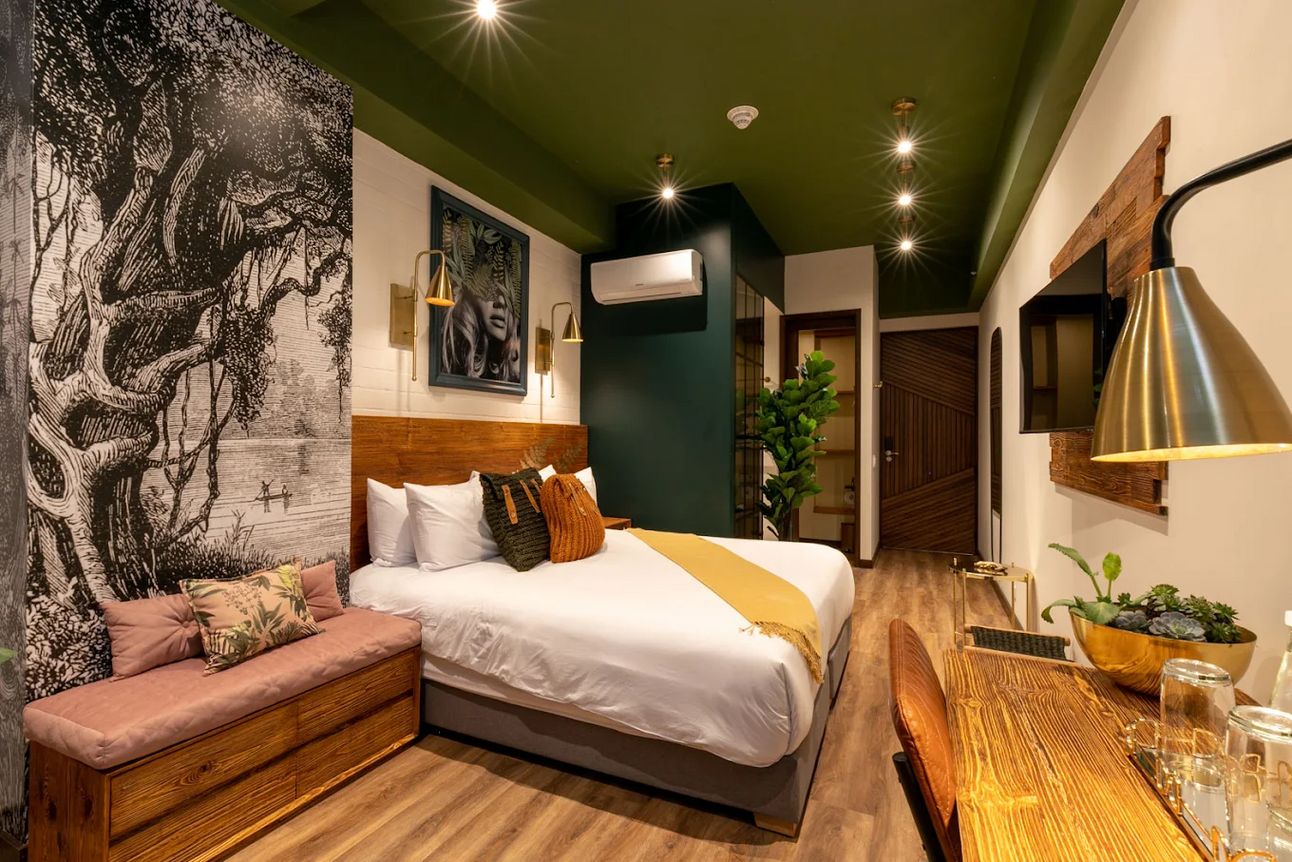 The rooms are adorable! | 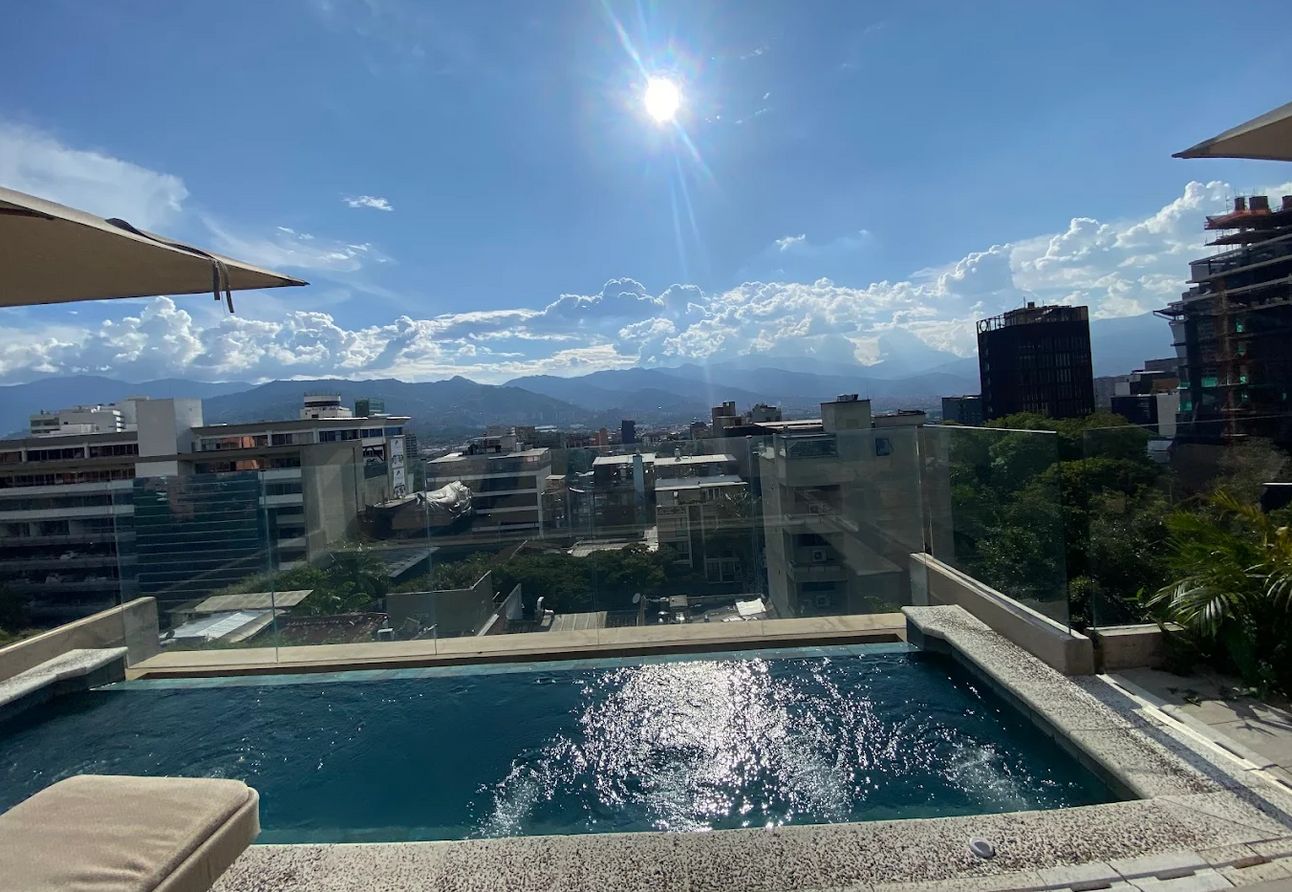 This was my sanctuary. |
🌿 Landmark Hotel (Quiet Poblado)
Just a 10-minute walk away—but a whole different world. The Landmark, run by the same hotel group, is modern, calm, and elegant. And the surrounding neighborhood? Quiet, charming, and seductive.
• Beautiful rooftop pool and restaurant (perfect for golden-hour video shoots) • Creative rooms with balconies and stylish local touches A fully equipped 24-hour gym FREE Laundry (yes!—this was such a relief!) • A staff that treats you like family • Excellent restaurants just steps away—not technically part of the hotel, but absolutely worth your time
Together, Celestino and Landmark show both faces of Poblado: the energy and the ease. Stay at both and you’ll feel the contrast—and the connection.
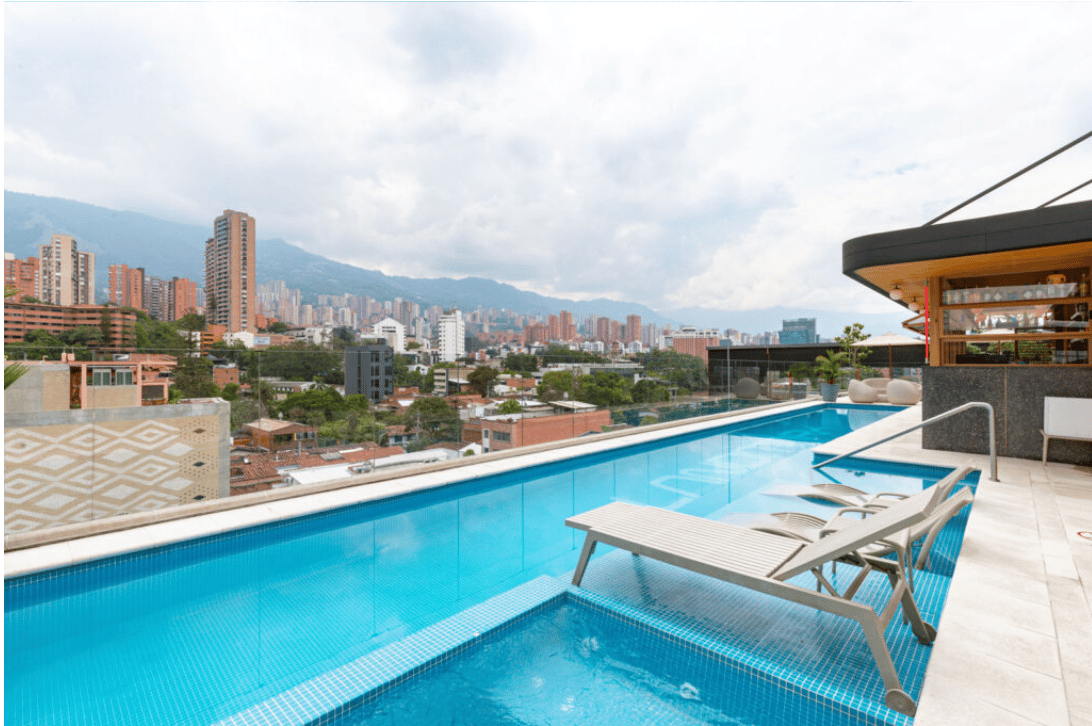 Loved the lap pool with a view | 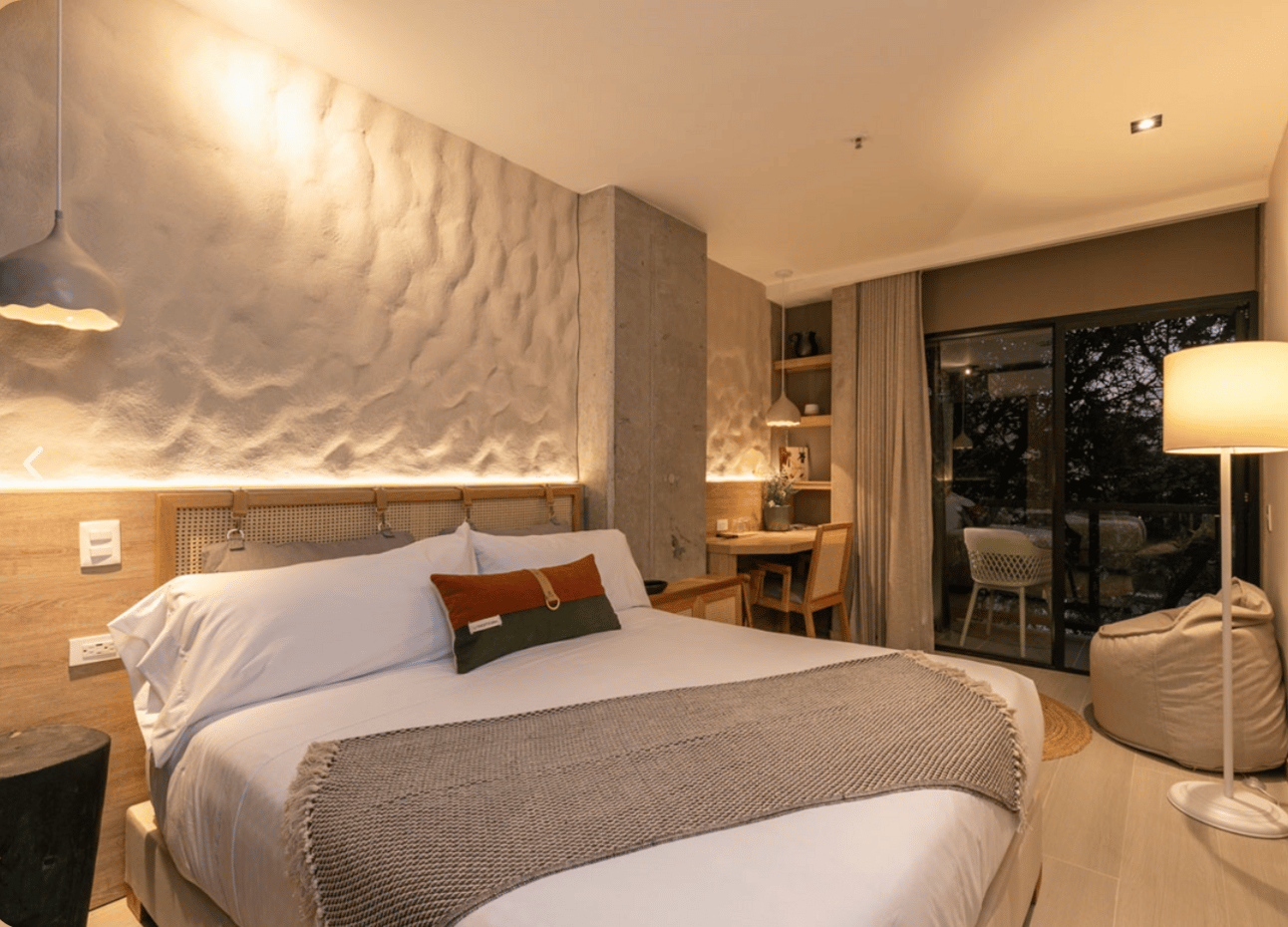 The room was elegent |
☕ Laureles & Coffee Shop Coworking
When the noise of Poblado wears off, head to Laureles—a quieter, greener neighborhood that many nomads fall in love with for the long haul (as I did).
My favorite hidden gem? Naturalia — a delightful coffee shop where the food is amazing, the staff kind, and the daily lunch menu is a true bargain. It quickly became my default office.
Also, don’t sleep on Pergamino Coffee: • Medellín’s beloved local chain (think: Colombian Starbucks, but way cooler) • Great coffee (so I’m told-I drink tea), reliable Wi-Fi, and ideal for people-watching • Power outlets, strong breakfasts, and almond croissants worth writing home about
Whether or not you need a formal coworking space, these cafés offer community, calm, and connection.
🌎 Cost of Living: Still One of the Best in the World
For under $1,500/month, you can live beautifully:
• Affordable furnished apartments or co-living studios • Local produce and meals often under $5 (and the street food? Memories of Thailand) • Metro rides: ~$0.70 • Uber (or motorbike rides) for next to nothing • Coworking day passes from $6–10/day
You get modern city perks without Western prices.
🌈 Why It Works for PrideNomads
Colombia isn’t perfect—but it’s growing, softening, evolving.
• Legal LGBTQ+ protections are stronger than in many U.S. states • Queer-friendly spaces are expanding outside the capital • Locals are often warm, curious, and open • Creative communities are flourishing—especially in art, music, and design
You can be yourself here—and still build something that matters.
Final Word: Freedom Feels Different Here
If you’ve been craving a new base—not just a trip—Colombia might just be it.
It’s not just the mountains or the mango juice or the music on every corner.
It’s the feeling of belonging without having to explain yourself.
Next week: I’ll tell you about a little mountain town that immediately seduced me—and where I had the best burger and fries of my life. (No kidding.)
✈️ Want to go deeper? We’re compiling stories from queer nomads already living in Colombia. Want to share yours? Just reply and say, “Send me Colombia.”
P.S. You don’t have to wait for the world to get safer. Sometimes you just need to find a place where your wings don’t scare anyone.
NOMAD HEALTH:
We Cross Borders. And We Still Need Belonging.
When we talk about queer digital nomad life, the spotlight often lands on logistics: Which visa? Which country? What’s the cost of living?
But underneath all that is a deeper, quieter truth:
What happens when you land somewhere beautiful… and feel completely alone?
I’ll never forget when my iPhone got stolen in Medellín. Suddenly I had no maps, no messages, no way to call anyone. And worse—no one to call. The city felt cold. I felt stupid. Unsafe. Invisible.
But just when the spiral was hitting, I turned a corner—literally—and ran into someone I’d met in the immigration line.
We hugged. Talked. Laughed.
And in that moment, it was okay again.
This is what we mean when we say:
Mental health and emotional safety matter just as much as visa policy.
Too many queer nomads end up “back in the closet” despite being in countries with rainbow flags on every café window. Because beyond the tourist zones, culture shifts. Safety becomes situational. And the double life returns.
Add to that the constant rebuilding of friendships, the expat turnover, the subtle exclusions—especially if you’re trans, BIPOC, or nonbinary—and it can start to wear you down.
So what’s the answer?
We build belonging on purpose.
Here’s what helps:
🫂 Peer support: Telegram chats. Local LGBTQ+ meetups. Weekly dinners.
🛖 Safe physical spaces: Colivings that don’t just tolerate us but celebrate us.
🧠 Mental health access: LGBTQ+-affirming therapists who get our lives.
🏳️🌈 Visible allyship: In coworking spaces, cafés, city programs. Not just during Pride.
We’re not just crossing borders—we’re seeking home.
So yes, get the visa.
Plan the route.
But also:
Pack your emotional armor. Scout your people. And build community before you need it.
Because when things go wrong—and sometimes they will—what saves you won’t be a SIM card. It’ll be someone who knows your name.
P.S. Got a story like this? Reply and tell us. You’re never as alone as you think.
Answer to Today’s Quiz
Beirut, Lebanon.
Despite regional tensions, Beirut has long had a complex queer history — with speakeasy bars, underground drag, and poets documenting same-sex love even under censorship. Legal protections are minimal, but the spirit is fierce.
Tell us what you REALLY think:How did you like today's newsletter? Feel free to leave additional comments! |
NOTE: Some of the links we provide may be affiliate links, which may potentially generate a referral fee to us. That’s one way we’re able to keep PrideNomad available to you at no cost. Rest assured that we only recommend providers who we feel can deliver great value to you.